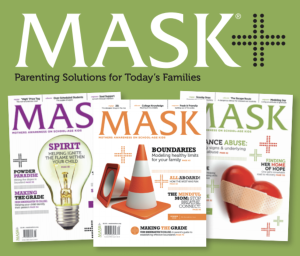
MASK’s Need-to-Know Tips
August 13, 2022
Letting Go: Learning to Redefine Family Time
August 17, 2022As parents, our job is to create healthy boundaries and model good behavior for our kids. When we start lecturing them, they often tune us out. But make no mistake, they are always paying attention to our actions. Here are seven ways to walk the talk and be a positive role model in our kids’ lives.
Limit Screen Time – It’s tempting to pull out your phone every time you hear it ding or feel it vibrate in your pocket, but this interrupts family time and teaches poor manners. Set rules for using digital devices that the whole family is expected to follow. For example, make dinnertime a “no-phone zone,” so you can enjoy your meal and share the day’s events without distractions. When your child is talking to you, make eye contact and resist the urge to glance over at your phone or the TV.
Respect Privacy – When your child moves into puberty, they need more space and privacy. A closed door is a sign that the person inside is looking for time alone. Knock and wait for a response before entering your adolescent’s room. This will also teach your kids to respect your closed door when you want some quiet for yourself.
Drive Responsibly – When you get behind the wheel, model the kind of behavior you expect your kids to have. This starts years before they get their driving permit. If you need to send an urgent text or talk on the phone, pull over or ask them to answer the phone for you. Avoid the temptation to speed, even if you’re running late and don’t drink and drive. If you violate these basic rules of the road, you are signaling to them that they can do the same.
Manage Your Emotions – Everyone feels anger, sadness or frustration from time to time, but what matters is how you express it. Instead of yelling, cursing or slamming doors, teach kids to acknowledge their intense feelings. Show them that it’s okay to cry when they feel sad or to take a break and step away from a situation, so they have time to calm down before reengaging with the people around them.
Stay Fresh and Clean – Teach kids good hygiene by setting a daily bathing routine at an early age. Show them how to properly brush and floss their teeth, not only to keep their teeth and gums healthy, but also to maintain fresh breath. Remind them to wash hands before preparing meals together and to cover their mouths when coughing or sneezing. As they reach adolescence, convey the importance of wearing deodorant and showering, especially after exercising.
Nurture Your Body – Prepare nutritious, well-balanced meals for your family and avoid fad diets or binging on junk food. Limit your alcohol intake and if you smoke, show your kids you have the self-discipline to quit. Carve out time daily to move your body. Spend time outdoors with your kids playing sports or going to the park.
Keep Your Word – If you make a commitment, always try to follow through — whether you promise to give someone a ride, volunteer to help out at a food bank or plan to meet a friend for lunch. Be on time when you’re dropping off kids at school or taking them to a doctor’s appointment. This will teach them the importance of minding their curfew and completing chores on time. By honoring commitments, kids learn how to be dependable and trustworthy, which is the cornerstone of healthy relationships.
by Angela Ambrose
MASK the Parenting Magazine a quarterly publication providing solutions for Today’s Families.
The parenting manual offering solutions to the modern-day challenges families face. From Pre-K
through College stay up to date on the modern day issues families face.
Are you up to date on the issues your child is facing?
MASK Mothers Awareness on School-age Kids offers parenting solutions for today’s families. MASK tackles important topics – from drugs and alcohol to bullying and Internet safety -and gives students, parents and the community the knowledge and tools to manage these potential challenges.
Subscribe today! https://www.tools4teaching.com/product/mask-the-magazine/
Download and share the MASKmatters app now! Made for children, parents, teachers and in Spanish.
Have solutions at your fingertips
Available free on apple and google play links below
Apple https://apps.apple.com/us/app/maskmatters/id1482305692
Google Play
https://play.google.com/store/apps/details?id=com.maskmatters.maskmattersapp&hl=en_US&gl=US




